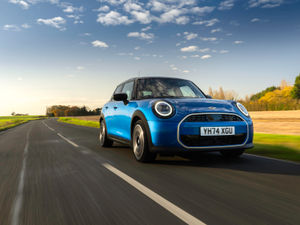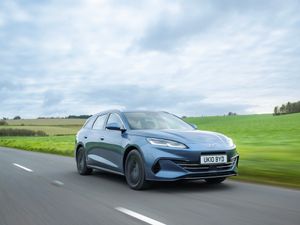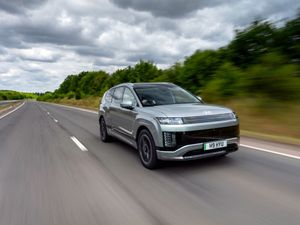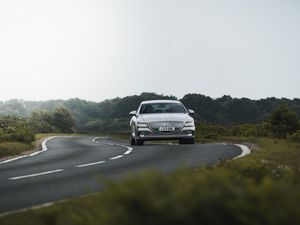Impressive performance from a world class leader
The soaring sales success of the Range Rover Evoque came as a bit of a surprise even to Land Rover: now it has an equally trendy cousin set to keep Wolverhampton's new engine plant busy for years to come.
The new Discovery Sport is the successor to the Freelander, but is in every way a brand new car.
It shares styling cues and a lot of parts with the Evoque, but is even more capable, roomier – with seven seats and more cargo space - and more versatile in an impressive piece 4x4 meets estate car packaging for the family.
Prices for the seven current versions run from £32,395 to £42,995 and all are powered by the same 2.2 litre, 190PS diesel with either a six speed manual of new NINE speed auto. Further versions will follow, including a front wheel drive only model with a new engine producing a tax-busting 119g/km of CO2 – the lowest yet by some margin for a Land Rover – once the new Midlands engine plant comes fully on stream.
The Discovery Sport has all the latest gizmoes and gadgets which make its off-road and bad weather performance class-leading, but you'd expect that from a Land Rover.
But it isn't just the technology which makes it space age: it's the interior. While it's only fractionally longer and wider than its predecessor the Freelander, it has two extra seats in the back. It's partly due to a revolutionary new multi-link rear suspension system invented by Land Rover: ultra compact to free up interior space but tough enough to cope with the rigours of off-roading. And you can even opt for a proper spare wheel (a rare enough treat these days for those of us who've had a puncture and learned to hate those foam canister things).
The second row of three seats also slide backwards or forwards by up to 160mm. Occupants get the sort of legroom usually reserved for Range Rover passengers and you still have 479 litres of cargo space. Slide them forward and you give third row passengers more leg space or create a class-leading 689 litres for cargo. With the second and third row seats folded flat you have very nearly 1,700 litres of luggage room.
Land Rover describes the seating layout as '5 + 2' recognising that the third row seats are probably best reserved for youngsters up to the age of 13 for longer journeys.
The new car's capabilities were unveiled to the world in the frozen wastes of Iceland to prove while its interior is refined and cossetting, it's a true Land Rover underneath.
It handles as sharply, and with as much steering feedback, as an upmarket saloon, but soaks up the bumps for the sort of ride quality off-roader drivers of the past could only have dreamed about.
Its four-wheel drive system and electronics automatically sort out traction and stability so competently that – admittedly shod with proper winter tyres – speeds of up to 70mph on compacted snow were taken in its stride. Even the icy slopes of one of the country's volcanoes, and roads closed to locals well used to such conditions, seemed to pose no problems.
You don't need to be an expert like 4x4 geeks of the past. Now you just press the appropriate Terrain Response System button (in this case grass, snow and ice) and the computers sort out the most appropriate throttle, chassis, gearbox and all-wheel drive settings for the conditions.
The Discovery Sport is built using a combination of aluminium and other materials to both reduce weight and create a stiffer, stronger 'box' for occupants, a mix also largely responsible for its improved dynamics both on and off road.
Its construction has helped it win a maximum five star safety rating, but there's another innovation which obviously impressed the boffins at Euro NCAP. Not only is the stylish, sleeker front end more 'pedestrian friendly' than traditional 4x4s, the Discovery Sport has a pedestrian airbag. It deploys in milliseconds in a town collision with a pedestrian to protect his/her head.
Wind and engine noise are low, due to its sleek, low-drag shape. For cars equipped with the ZF auto box it has nine ratios to choose from, and so engine revs are confined to a narrower , quieter band. First is recalibrated for a lower 'crawl' speed to give you finer control off-road (or in car parks) and a higher top ratio for more refined motorway cruising and economy.
Diesel consumption averages between 44.9 and 48mpg and CO2 emissions from 157 to 166g/km, depending on model and transmission. The manual is the more economical, but at 8.9 seconds the auto is around 1.5 seconds quicker on the benchmark 0 to 62mph acceleration test. All the figures are improvements on the outgoing Freelander, saving company car drivers' tax bills as well as spending less at the pumps.
The Discovery Sport's sleek, aerodynamic lines belie its impressive interior space, and the cabin has a quality feel to it.
The comprehensive instrument panel is set out beneath the new colour, touch screen 'infotainment' system which is your interface with everything from how much power is going to each wheel to SatNav and your choice of tunes. It is designed to fully link to your 'smartphone' and a range of apps for added versatility.
Below that are the more traditional buttons such as the quick clear windscreen button which would be more than adequate for an average British winter. But I also found the 'max' button which not only cleared ice in near whiteout conditions, but even directed enough electric power and climate control system heat to soften up the wiper rubbers so that they could do their job again.
Other technologies available to the Disco Sport driver include auto dipping headlights, auto wipers, parking sensors with camera and a parking assist option, and traffic sign recognition. There's also an automatic emergency braking system to help prevent you becoming involved in a rear-end shunt (or at least reduce the impact) and special options for those pulling trailers or caravans.
The new car is also a more capable tower – its maximum trailer weight is up a whole 25 per cent, to a 2,500kgs maximum.
The Discovery Sport has inherited all the electronics which make off-roading easier and safer. Some only operate under the sort of extreme conditions which, frankly, few owners would seek out but it's a matter of pride with Land Rover (and thank goodness for that) that only the best will do. For its engineers, it just HAS to be the best in its field.
Naturally it has hill descent control, a system invented by the Midlands company, which automatically uses pulses of braking via the ABS system to ensure you don't lock the wheels on a steep, slippery slope resulting in a potentially disasterous slide.
This has been refined on the new car, for an even steadier descent, and is joined by gradient release and engine drag torque controls: now not even the normal braking effect of the engine will lock you into a slide.
It can be one of the scariest and most difficult of manoeuvres, but you quickly learn to just take your feet off the pedals and let the car do the rest. It's better at it than you – and it's just that easy. Added to that are the dynamic stability control system with both on and off road parameters, traction control and roll stability control.
Features such as driver, passenger and side air bags, air condition ing, cruise control, parking sensors and cameras, electric windows and mirrors are all standard from the entry level £32,395 upwards.
It's no secret that sales of the Evoque have proved to be three times that which even Land Rover hoped for since its launch in 2011. Its departure from the traditional, chunky design with the knowledge that you have supreme all-weather capability under the skin (even if you rarely use it) was obviously a winner.
Now the new Discovery Sport brings the same shapeliness to the more functional branch of the family.
Its extra room, more versatile interior and, of course, those extra two seats put it in a class apart from the competition.
Like the outgoing Freelander 2, the Discovery Sport will be built on Merseyside at Jaguar Land Rover's Haleswood plant, alongside the Evoque.
But with the engines for both built at Wolverhampton, the signs are that JLR's massive investment there will be justified and the jobs of its workers secure in years to come.





